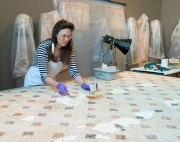Difference between revisions of "Chelating agent"
Jump to navigation
Jump to search
(username removed) |
(username removed) |
||
| Line 2: | Line 2: | ||
== Description == | == Description == | ||
| − | A heterocyclic ring compound that can attract and hold a metal ion. Chelating agents are used to remove traces a metals in solutions, such as [http://cameo.mfa.org/materials/fullrecord.asp?name=zinc zinc], [http://cameo.mfa.org/materials/fullrecord.asp?name=iron iron], [http://cameo.mfa.org/materials/fullrecord.asp?name=copper copper], [http://cameo.mfa.org/materials/fullrecord.asp?name=manganese manganese], and [http://cameo.mfa.org/materials/fullrecord.asp?name=cobalt cobalt]. They are added to detergents to minimize and precipitation or discoloration caused by unwanted metal ions. Chelating agents are also used in water softeners. Examples of chelating agents are ethylenediaminetetraacetic acid ([http://cameo.mfa.org/materials/fullrecord.asp?name=EDTA EDTA]), nitrilotriacetic acid, n-hydroxyethylethylenediaminetriacetic acid (HEDTA), hemoglobin, [http://cameo.mfa.org/materials/fullrecord.asp?name=chlorophyll chlorophyll], as well as several simple organic acids like [http://cameo.mfa.org/materials/fullrecord.asp?name=oxalic | + | A heterocyclic ring compound that can attract and hold a metal ion. Chelating agents are used to remove traces a metals in solutions, such as [http://cameo.mfa.org/materials/fullrecord.asp?name=zinc zinc], [http://cameo.mfa.org/materials/fullrecord.asp?name=iron iron], [http://cameo.mfa.org/materials/fullrecord.asp?name=copper copper], [http://cameo.mfa.org/materials/fullrecord.asp?name=manganese manganese], and [http://cameo.mfa.org/materials/fullrecord.asp?name=cobalt cobalt]. They are added to detergents to minimize and precipitation or discoloration caused by unwanted metal ions. Chelating agents are also used in water softeners. Examples of chelating agents are ethylenediaminetetraacetic acid ([http://cameo.mfa.org/materials/fullrecord.asp?name=EDTA EDTA]), nitrilotriacetic acid, n-hydroxyethylethylenediaminetriacetic acid (HEDTA), hemoglobin, [http://cameo.mfa.org/materials/fullrecord.asp?name=chlorophyll chlorophyll], as well as several simple organic acids like [http://cameo.mfa.org/materials/fullrecord.asp?name=oxalic%20acid oxalic acid], [http://cameo.mfa.org/materials/fullrecord.asp?name=malic%20acid malic acid]. [http://cameo.mfa.org/materials/fullrecord.asp?name=rubeanic%20acid rubeanic acid] and [http://cameo.mfa.org/materials/fullrecord.asp?name=citric%20acid citric acid]. |
== Synonyms and Related Terms == | == Synonyms and Related Terms == | ||
| − | chelator; chelation, sequestering agent; EDTA; Trilon; Komplexone; Tritriplex; | + | chelator; chelation, sequestering agent; EDTA; Trilon; Komplexone; Tritriplex; Calgon® |
== Authority == | == Authority == | ||
| Line 12: | Line 12: | ||
* Wikipedia, the free encyclopedia, at http://www.wikipedia.com Comment: http://en.wikipedia.org/wiki/Chelating (Accessed Oct. 18, 2005) | * Wikipedia, the free encyclopedia, at http://www.wikipedia.com Comment: http://en.wikipedia.org/wiki/Chelating (Accessed Oct. 18, 2005) | ||
| − | * | + | * Random House, ''Webster's Encyclopedic Unabridged Dictionary of the English Language'', Grammercy Book, New York, 1997 |
* ''The American Heritage Dictionary'' or ''Encarta'', via Microsoft Bookshelf 98, Microsoft Corp., 1998 | * ''The American Heritage Dictionary'' or ''Encarta'', via Microsoft Bookshelf 98, Microsoft Corp., 1998 | ||
| − | * | + | * G.S.Brady, ''Materials Handbook'', McGraw-Hill Book Co., New York, 1971 Comment: p. 190 |
| − | * | + | * Richard S. Lewis, ''Hawley's Condensed Chemical Dictionary'', Van Nostrand Reinhold, New York, 10th ed., 1993 |
| − | * | + | * Hoechst Celanese Corporation, ''Dictionary of Fiber & Textile Technology'' (older version called Man-made Fiber and Textile Dictionary, 1965), Hoechst Celanese Corporation, Charlotte NC, 1990 |
* ''The Dictionary of Paper'', American Paper Institute, New York, Fourth Edition, 1980 | * ''The Dictionary of Paper'', American Paper Institute, New York, Fourth Edition, 1980 | ||
| Line 26: | Line 26: | ||
* ''Van Nostrand's Scientific Encyclopedia'', Douglas M. Considine (ed.), Van Nostrand Reinhold, New York, 1976 | * ''Van Nostrand's Scientific Encyclopedia'', Douglas M. Considine (ed.), Van Nostrand Reinhold, New York, 1976 | ||
| − | * | + | * Hermann Kuhn, ''Conservation and Restoration of Works of Art and Antiquities'', Butterworths, London, 1986 |
| − | * | + | * Richard C. Wolbers, Nanette T. Sterman, Chris Stavroudis, ''Notes for Workshop on New Methods in the Cleaning of Paintings'', J.Paul Getty Trust, Los Angeles, 1990 |
| − | * | + | * Theodore J. Reinhart, 'Glossary of Terms', ''Engineered Plastics'', ASM International, 1988 |
[[Category:Materials database]] | [[Category:Materials database]] | ||
Revision as of 06:27, 24 July 2013
Description
A heterocyclic ring compound that can attract and hold a metal ion. Chelating agents are used to remove traces a metals in solutions, such as zinc, iron, copper, manganese, and cobalt. They are added to detergents to minimize and precipitation or discoloration caused by unwanted metal ions. Chelating agents are also used in water softeners. Examples of chelating agents are ethylenediaminetetraacetic acid (EDTA), nitrilotriacetic acid, n-hydroxyethylethylenediaminetriacetic acid (HEDTA), hemoglobin, chlorophyll, as well as several simple organic acids like oxalic acid, malic acid. rubeanic acid and citric acid.
Synonyms and Related Terms
chelator; chelation, sequestering agent; EDTA; Trilon; Komplexone; Tritriplex; Calgon®
Authority
- Wikipedia, the free encyclopedia, at http://www.wikipedia.com Comment: http://en.wikipedia.org/wiki/Chelating (Accessed Oct. 18, 2005)
- Random House, Webster's Encyclopedic Unabridged Dictionary of the English Language, Grammercy Book, New York, 1997
- The American Heritage Dictionary or Encarta, via Microsoft Bookshelf 98, Microsoft Corp., 1998
- G.S.Brady, Materials Handbook, McGraw-Hill Book Co., New York, 1971 Comment: p. 190
- Richard S. Lewis, Hawley's Condensed Chemical Dictionary, Van Nostrand Reinhold, New York, 10th ed., 1993
- Hoechst Celanese Corporation, Dictionary of Fiber & Textile Technology (older version called Man-made Fiber and Textile Dictionary, 1965), Hoechst Celanese Corporation, Charlotte NC, 1990
- The Dictionary of Paper, American Paper Institute, New York, Fourth Edition, 1980
- Van Nostrand's Scientific Encyclopedia, Douglas M. Considine (ed.), Van Nostrand Reinhold, New York, 1976
- Hermann Kuhn, Conservation and Restoration of Works of Art and Antiquities, Butterworths, London, 1986
- Richard C. Wolbers, Nanette T. Sterman, Chris Stavroudis, Notes for Workshop on New Methods in the Cleaning of Paintings, J.Paul Getty Trust, Los Angeles, 1990
- Theodore J. Reinhart, 'Glossary of Terms', Engineered Plastics, ASM International, 1988
